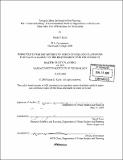| dc.contributor.advisor | David Laws. | en_US |
| dc.contributor.author | Kelly, Sarah D. (Sarah Driscoll) | en_US |
| dc.contributor.other | Massachusetts Institute of Technology. Dept. of Urban Studies and Planning. | en_US |
| dc.date.accessioned | 2006-07-13T15:22:09Z | |
| dc.date.available | 2006-07-13T15:22:09Z | |
| dc.date.copyright | 2005 | en_US |
| dc.date.issued | 2005 | en_US |
| dc.identifier.uri | http://hdl.handle.net/1721.1/33412 | |
| dc.description | Thesis (M.C.P.)--Massachusetts Institute of Technology, Dept. of Urban Studies and Planning, 2005. | en_US |
| dc.description | Includes bibliographical references (p. 90-92). | en_US |
| dc.description.abstract | This thesis examines the planning process for a major expansion project in the Port of Rotterdam, the Netherlands (Maasvlakte 2), as a case study of mutual gains-oriented consensus building and interactive problem solving. After years of formal negotiations between a broad range of local, regional, and national stakeholders, the project planning came to an impasse when environmental organizations and port expansion proponents could not reconcile their positions on if and under what conditions the port should be extended. I posit that at this critical juncture certain environmental organizations took an uncharacteristically proactive role in altering the relationships between stakeholders in a way that was crucial to the ultimate achievement of a consensus among them. The case demonstrates how actors other than those who are formally responsible for structuring negotiations can profoundly influence them so as to promote a sense of interdependence and shared vision among even the seemingly most oppositional factions. This conclusion supports the assertion by network theorists that in the modern era effective planning and policy formulation cannot be achieved solely through government decision-making. | en_US |
| dc.description.abstract | (cont.) Instead, they must rely upon more deliberative processes that incorporate a wider range of actors. Based upon this analysis, I prescribe a model of interaction for actors in complex, multi-stakeholder negotiations, which, while particularly relevant to contemporary port planning projects, is broadly applicable to diverse contexts. | en_US |
| dc.description.statementofresponsibility | by Sarah D. Kelly. | en_US |
| dc.format.extent | 92 p. | en_US |
| dc.format.extent | 5090378 bytes | |
| dc.format.extent | 5094172 bytes | |
| dc.format.mimetype | application/pdf | |
| dc.format.mimetype | application/pdf | |
| dc.language.iso | eng | en_US |
| dc.publisher | Massachusetts Institute of Technology | en_US |
| dc.rights | M.I.T. theses are protected by copyright. They may be viewed from this source for any purpose, but reproduction or distribution in any format is prohibited without written permission. See provided URL for inquiries about permission. | en_US |
| dc.rights.uri | http://dspace.mit.edu/handle/1721.1/7582 | |
| dc.subject | Urban Studies and Planning. | en_US |
| dc.title | Toward a more deliberative port planning : the "vision and daring" of environmental NGOs in negotiations on the Second Maasvlakte, Port of Rotterdam, the Netherlands | en_US |
| dc.type | Thesis | en_US |
| dc.description.degree | M.C.P. | en_US |
| dc.contributor.department | Massachusetts Institute of Technology. Department of Urban Studies and Planning | |
| dc.identifier.oclc | 62739298 | en_US |
